Potřebujeme váš souhlas k využití jednotlivých dat, aby se vám mimo jiné mohly ukazovat informace týkající se vašich zájmů. Souhlas udělíte kliknutím na tlačítko „OK“.
ASTM D5836-08(2013)
Standard Test Method for Determination of 2,4-Toluene Diisocyanate (2,4-TDI) and 2,6-Toluene Diisocyanate (2,6-TDI) in Workplace Atmospheres (1-2 PP Method)
Automaticky přeložený název:
Standardní zkušební metoda pro stanovení 2,4-toluendiisokyanátu (2,4-TDI) a 2,6-toluendiizokyanát (2,6-TDI) v ovzduší na pracovišti (1-2 PP metoda)
NORMA vydána dne 1.4.2013
Informace o normě:
Označení normy: ASTM D5836-08(2013)
Poznámka: NEPLATNÁ
Datum vydání normy: 1.4.2013
Kód zboží: NS-32737
Počet stran: 5
Přibližná hmotnost: 15 g (0.03 liber)
Země: Americká technická norma
Kategorie: Technické normy ASTM
Kategorie - podobné normy:
Anotace textu normy ASTM D5836-08(2013) :
Keywords:
2,4-toluene diisocyanate, 2,6-toluene diisocyanate,1-(2-Pyridyl)piperazine, 2,4-TDI, 2,6-TDI, air monitoring, high-performance liquid chromatography, sampling and analysis, workplace atmospheres, ICS Number Code 13.040.30 (Workplace atmospheres)
Doplňující informace
| Significance and Use | ||||||||||
|
5.1 Diisocyanates are used in the production of polyurethane foams, plastics, elastomers, surface coatings, and adhesives (5,6). It has been estimated that the production of TDI will steadily increase during the future years. 5.2 Diisocyanates are irritants to eyes, skin, and mucous membrane and are respiratory sensitizers. Chronic exposure to low concentrations of diisocyanates produces an allergic sensitization which may progress into asthmatic bronchitis 5.3 The Occupational Safety and Health Administration (OSHA) has a permissible exposure limit (PEL) for 2,4-TDI of 0.02 ppm or 0.14 mg/m3 as a ceiling limit. There is no OSHA PEL for 2,6–TDI(9). The American Conference of Governmental Industrial Hygienists (ACGIH) has a time–weighted average (TWA) Threshold Limit Value (TLV) of 0.005 ppm or 0.036 mg/m3 and a short-term exposure limit (STEL) of 0.02 ppm or 0.14 mg/m3 for either 2,4–TDI, or 2,6–TDI, or for a mixture of 2,4– and 2,6–TDI(10). 5.4 This proposed test method has been found satisfactory for measuring 2,4 and 2,6-TDI levels in the workplace. |
||||||||||
| 1. Scope | ||||||||||
|
1.1 This test method describes the determination of 2,4-toluene diisocyanate (2,4-TDI) and 2,6-toluene diisocyanate (2,6-TDI) in air samples collected from workplace atmospheres in a cassette containing a glass-fiber filter impregnated with 1-(2-pyridyl)piperazine (1-2 PP). This procedure is very effective for determining the vapor content of atmospheres. Atmospheres containing aerosols may cause TDI results to be underestimated. 1.2 This test method uses a high-performance liquid chromatograph (HPLC) equipped with a fluorescence or an ultraviolet (UV) detector (1-4).2,3 1.3 The validated range of the test method, as written, is from 1.4 to 5.6 μg of 2,4-TDI and 2,6-TDI which is equivalent to approximately 9.8 to 39 ppb for 2,4-TDI and 2,6-TDI based on a 20-L air sample. The HPLC method using an UV detector is capable of detecting 0.078 μg of 2,4-TDI and 0.068 μg of 2,6-TDI in a 4.0-mL solvent volume, which is equivalent to 0.55 ppb for 2,4-TDI and 0.48 ppb for 2,6-TDI based on a 20-L air sample. 1.4 The isomers of 2,4-TDI, and 2,6-TDI, can be separated utilizing a reversed phase column for the HPLC method. Because industrial applications employ an isomeric mixture of 2,4- and 2,6-TDI, the ability to achieve this separation is important. 1.5 The values stated in SI units are to be regarded as standard. No other units of measurement are included in this standard. 1.6 This standard does not
purport to address all of the safety concerns, if any, associated
with its use. It is the responsibility of the user of this standard
to establish appropriate safety and health practices and determine
the applicability of regulatory limitations prior to use.
Standard Practice for Sampling
Atmospheres to Collect Organic Compound Vapors (Activated Charcoal
Tube Adsorption Method) Standard Terminology Relating to Sampling
and Analysis of Atmospheres (Includes all amendments and changes
9/7/2020). Standard Practice for Planning the
Sampling of the Ambient Atmosphere Standard Practice for Conducting an
Interlaboratory Study to Determine the Precision of a Test
Method Standard Specification for Reagent
Water |
Podobné normy:
Historická
1.4.2012
Historická
1.10.2013
Historická
1.10.2013
Historická
1.4.2013
Historická
15.10.2012
Historická
1.10.2011
Odebírejte informace o nově vydaných normách ZDARMA:
Chcete pravidelně odebírat informace o nově vycházejících normách z celého světa a to zcela zdarma?
Přihlašte se k odběru. Vše je velice jednoduché a absolutně ZDARMA.
Na výběr máte vydavatele z celého světa.


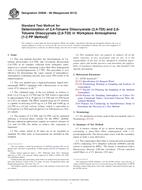
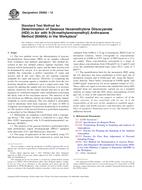 ASTM D6562-12
ASTM D6562-12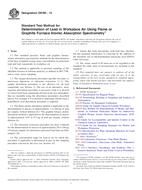 ASTM D6785-13
ASTM D6785-13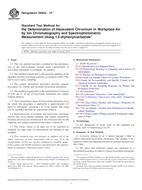 ASTM D6832-13e1
ASTM D6832-13e1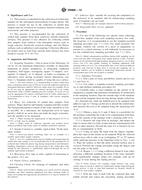 ASTM D6966-13
ASTM D6966-13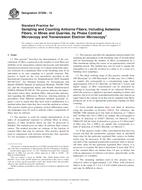 ASTM D7200-12
ASTM D7200-12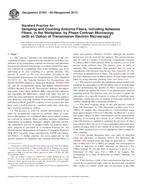 ASTM D7201-06(2011)..
ASTM D7201-06(2011)..
 Cookies
Cookies
